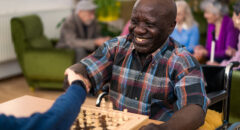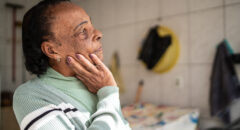
Defined as an irreversible, “progressive disease that destroys memory and other important mental functions,” everyone with a brain is at risk of developing Alzheimer’s disease. But did you know, African-Americans and Hispanics – specifically Blacks, are almost twice as likely as Whites to develop Alzheimer's or other forms of dementia during their lifetime? Hispanics are about one and one-half times as likely.
READ: Why Alzheimer's Affects Blacks Differently
Additionally, more than two-thirds of Americans with Alzheimer’s disease are women! Unfortunately, due to the commonality of the illness, many are left with a muddied sense of what causes it, common symptoms and whether it can be treated. Recently, BlackDoctor.org had the opportunity to chat with a former caregiver, Pat Etienne of Columbia, MO, who opened up about her experiences caring for her late brother, Bobby, as well as her personal battle with the sickness.
“When I was diagnosed, I had no idea there was no cure – or how widespread it was. What you receive upon your diagnosis are meds to relieve pain and discomfort,” said Pat. Adding, “I suspect most of the world doesn’t know that.” Pat went on to reveal no one (not even the diagnosing doctor) outlined the severity of the illness. “They didn’t tell me it was incurable. They hand you a prescription slip and say ‘come back in six months.’ They don’t have the answers.”
Meanwhile, Pat revealed her introduction to the disease was by way of a loved one. “What I learned through my brother, who was my introduction to dementia – which he developed from neglected diabetes – is that each case is different. Everything declined so rapidly. We were completely bewildered and had no idea what we were doing.”
Pat went on to discuss the moment she knew Bobby was dealing with more than aggravated diabetes. “He was resistive to running, physical activity of any kind, taking his meds -- he loved to run. It was this sudden onset of behavior – from the brother I knew when we were coconspirators – that I knew something else was going on.” According to the Alzheimer's Association, loss of appetite, restlessness, behavioral issues, mental decline, confusion, and loss of interest in hobbies, are just a handful of early detectors one may be dealing with dementia.
READ: 7 Tips For Traveling With Alzheimer's
“Every day is a challenge nobody is prepared for. To stop your life and all of sudden have to make arrangements for someone whose life may deteriorate rapidly is quite a dramatic journey,” Pat added of the challenges caretakers and loved ones face when caring for someone with dementia.
So, in an effort to improve the public’s understanding of the illness which plagues more than 5 million people (only half of whom have been diagnosed), Pat urged people, mainly the Black community, to be open and honest about their diagnosis and take swift action. “It’s vitally important that minorities, particularly the African American community acknowledge their vulnerably with this disease and use all the resources available to them,” she said.
“We’re already in trouble and fragile as a community if something is suspect – we’re at the top of the list. So, certainly any handicap or physical problem we’re experiencing – the Freddie Gray case comes to mind, as it definitely seems he was battling with something, that was simply aggravated by the bust – we have to accept that reality and operate in a way where we are open and assertive. Like ‘look, I suffer from dementia. Here are my bracelets in case you need to call somebody. After all, it’s very common for people with this disease to wander or come off delusion, irrational, or erratic.”
Alzheimer's disease is the sixth-leading cause of death in the United States and the only cause of death among the top 10 that cannot be prevented, cured or even slowed. While we mentioned it cannot be prevented or cured, if you believe that you or an loved one may be at risk, it would behoove you to act now! “Early diagnosis allows better access to quality medical care and support services, and provides the opportunity for people with Alzheimer’s disease to participate in decisions about their care, including providing informed consent for current and future plans,” said Ruth Drew, Director of Family and Information Services, Alzheimer’s Association.
“Knowing the diagnosis early enables the person with Alzheimer’s to get the maximum benefit from available treatments, and may also increase chances of participating in clinical drug trials that help advance research.”
For more information on crucial facts about the disease, visit the Alzheimer’s Association here.








